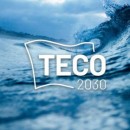A Norwegian “clean technology” company called TECO 2030 plans to take hydrogen fuel cell development in this country to the next level. To do so, it will open a state-of-the-art facility that will be both a factory and research and innovation center.
In the Norwegian company’s vision, fuel cells are “the engines of tomorrow,” but their application in the maritime industry is still limited. As The International Maritime Organization (IMO) is imposing harsher regulations regarding toxic emissions, ship-owners need to adapt and find viable solutions that will reduce the industry’s environmental footprint.
TECO 2030 has already been developing technologies for carbon capture and exhaust gas cleaning, which help vessels running on conventional fuel to reduce their footprint. The next step is to get to zero emissions, which can be achieved with the help of fuel cells. The company will open Norway’s first large-scale hydrogen fuel cell production facility. This is where it will develop fuel cells, together with AVL, an Austrian powertrain technology company.
The TECO 2030 Innovation Center won’t be just a factory, but also a hub for research and education. The company recently signed a cooperation agreement with UiT, the Arctic University of Norway. The University is located in Narvik, in northern Norway, where the future Innovation Center will be set up as well. UiT’s Faculty of Engineering Science and Technology currently offers courses in hydrogen and fuel cells, which is what makes it particularly interesting for the clean tech company.
On one hand, the company will benefit from the institution’s expertise, not only for future research projects, but also for improving the fuel cell production equipment at the factory. On the other hand, UiT researchers and students will gain access to the Center’s testing facilities, so it’s a win-win situation.
Through this joint project, Norway’s hydrogen fuel cell development will be accelerated. TECO 2030 hopes to produce “engines of tomorrow” for ships in particular, but also for other heavy-duty applications.
TECO 2030 has already been developing technologies for carbon capture and exhaust gas cleaning, which help vessels running on conventional fuel to reduce their footprint. The next step is to get to zero emissions, which can be achieved with the help of fuel cells. The company will open Norway’s first large-scale hydrogen fuel cell production facility. This is where it will develop fuel cells, together with AVL, an Austrian powertrain technology company.
The TECO 2030 Innovation Center won’t be just a factory, but also a hub for research and education. The company recently signed a cooperation agreement with UiT, the Arctic University of Norway. The University is located in Narvik, in northern Norway, where the future Innovation Center will be set up as well. UiT’s Faculty of Engineering Science and Technology currently offers courses in hydrogen and fuel cells, which is what makes it particularly interesting for the clean tech company.
On one hand, the company will benefit from the institution’s expertise, not only for future research projects, but also for improving the fuel cell production equipment at the factory. On the other hand, UiT researchers and students will gain access to the Center’s testing facilities, so it’s a win-win situation.
Through this joint project, Norway’s hydrogen fuel cell development will be accelerated. TECO 2030 hopes to produce “engines of tomorrow” for ships in particular, but also for other heavy-duty applications.







